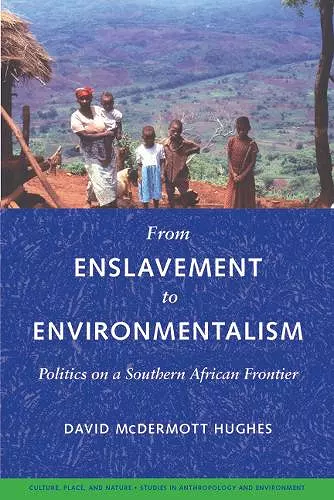From Enslavement to Environmentalism
Politics on a Southern African Frontier
David McDermott Hughes author K Sivaramakrishnan editor
Format:Paperback
Publisher:University of Washington Press
Published:2nd May '08
Currently unavailable, and unfortunately no date known when it will be back
This paperback is available in another edition too:
- Hardback£95.00(9780295985909)

Smart and original, this book will provoke interest and controversy among both advocates and critics of neoliberal development policy in Africa. Its strength lies precisely in its bold conceptual framework and polemical style. -- Eric Worby, Yale University From Enslavement to Environmentalism will make a considerable contribution to the understanding of how and why both states and NGOs intervene in questions of conservation, land use, and tenure rights, and with what effects. The theoretical and empirical contribution is valuable and groundbreaking. Hughes offers a fresh, grounded, and provocative take on questions central to political ecology in southern Africa. . -- Jocelyn Alexander, Queen Elizabeth House, University of Oxford
Offers an ethnographic and historical look at the politics of eco-development in the Zimbabwe-Mozambique border zone. This book argues that European colonization in southern Africa has reshaped rural politics and culture, as neo-liberal developers commoditize the lands of African peasants in the name of conservation and economic progress.
From Enslavement to Environmentalism takes a challenging ethnographic and historical look at the politics of eco-development in the Zimbabwe-Mozambique border zone. David Hughes argues that European colonization in southern Africa--essentially an unsuccessful effort to turn the region into another North America or Australia--has profoundly reshaped rural politics and culture and continues to do so, as neoliberal developers commoditize the lands of African peasants in the name of conservation and economic progress.
Hughes builds his engaging analysis around a sort of natural experiment: in the past, whites colonized British Zimbabwe but avoided Portuguese Mozambique almost entirely. In Zimbabwe, chiefdoms that had historically focused on controlling people began to follow the English example of consolidating political power by dividing and controlling land. Meanwhile, in Mozambique, Portugal perpetuated traditional practices of recruiting and distributing forced labor as the primary means of securing power. The territory remained unmapped. For almost the entire twentieth century, a sharp disjuncture in the politics of land, leadership, labor, and resource use marked the border zone.
In the late 1990s, as white South Africans began to establish timber plantations in Mozambique, that difference began to be effaced. Under the banner of environmentalism and economic progress, tourism firms were allowed to claim peasant farmland. The objectives of liberal conservationists and developers, though high-minded, led them to commoditize ancestral lands. Southern African policymakers supported this new form of colonization as a form of racial integration between white investors and black peasants, paving the way for an ironic and contentious situation in which ethnic tolerance, gentrification, and land-grabbing have gone hand in hand.
From Enslavement to Environmentalism engages topics central to current debates in anthropology, resource politics, and development policy, and will be of interest to both regional specialists and generalists.
"Presents an exciting and well-researched overall appraisal of the history, culture, politics, and economics of the boundary region between Zimbabwe and Mozambique. This is a regional and interdisciplinary work that deserves attention from scholars of southern Africa and anyone interested in ideas around development, environment, and power in the postcolonial African state."
-- Jane Carruthers * Environmental History *"From Enslavement to Environmentalism is a theoretically, historically, and ethnographically rigorous book that will challenge academics and practitioners to rethink, requestion, and reevaluate current social processes and our well-intended roles in them. This is an exceptional and timely work, distinguished by Hughes's characteristic balance of insight, genuine, provocation, and concern."
* Society and Natural Resources *"From Enslavement to Environmentalism is an important contribution to the fields of political ecology, environmental anthropology, and Southern African studies. Hughes has combined archival research and ethnographic fieldwork to produce a historically situated account of contemporary struggles over land and development while raising fundamental questions about the nature of environment and development projects in Southern Africa."
* American Anthropologist *"McDermott Hughes. . . offers a rich anthropological interpretation of cultures of ownership and failures of liberalism . . . . Hughes has written a fine study of settlement and land politics in the southern regions of Africa. It is an important and interesting book, well worth the read."
* Canadian Journal of History *"An excellent study . . .presents policymakers, activists, and scholars alike with an important and provocative argument that deserves to be heard."
* International Journal of African Historical Studies *"A fascinating study of the history and current state of the politics of land and people on both sides of the Mozambique-Zimbabwe border. This is a valuable work in terms of its specific coverage of the Ndau-speaking people."
* African Studies Review *"This is an important book. Its contributions are multiple. The historical analysis of political development in these two regions of Mozambique and Zimbabwe is provocative, and suggests a novel way of viewing the dynamics of colonialism . . . . An important addition to the scant historiography of the region."
* Anthropological Quarterly *"From Enslavement to Environmentalism stands out in the debate on politics around community-based conservation in Africa and is very strong empirically."
* Electronic Green JournISBN: 9780295988405
Dimensions: unknown
Weight: 431g
288 pages